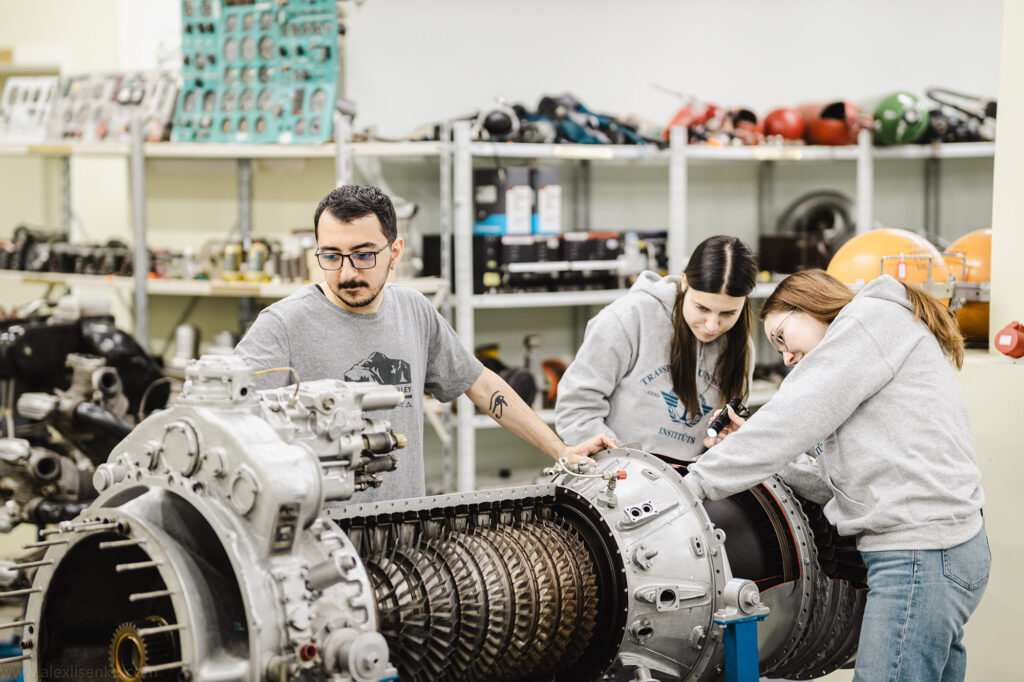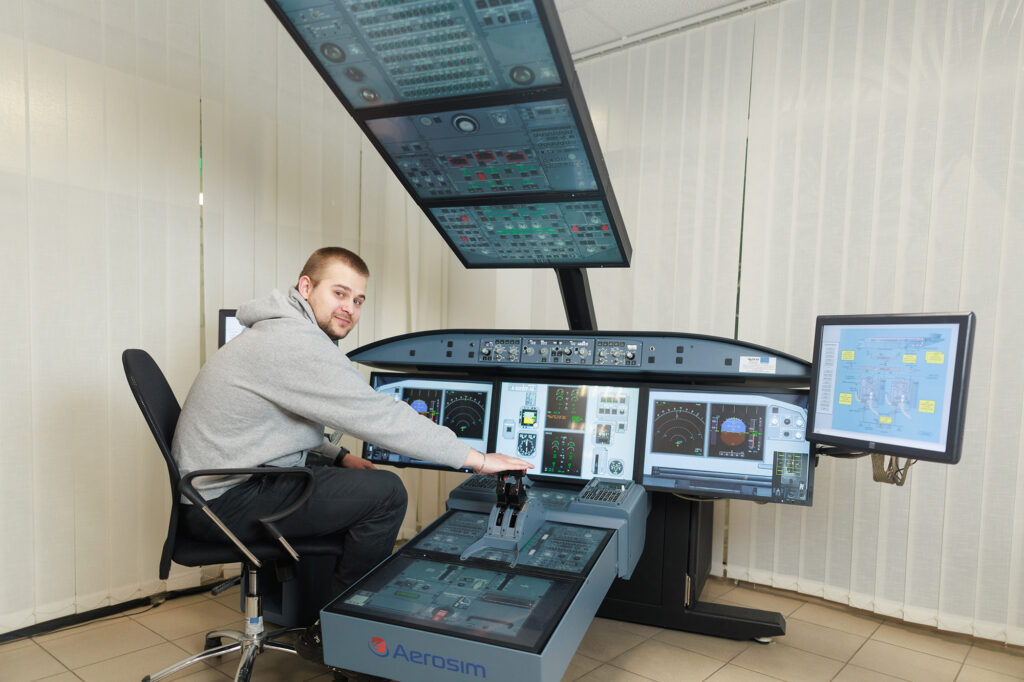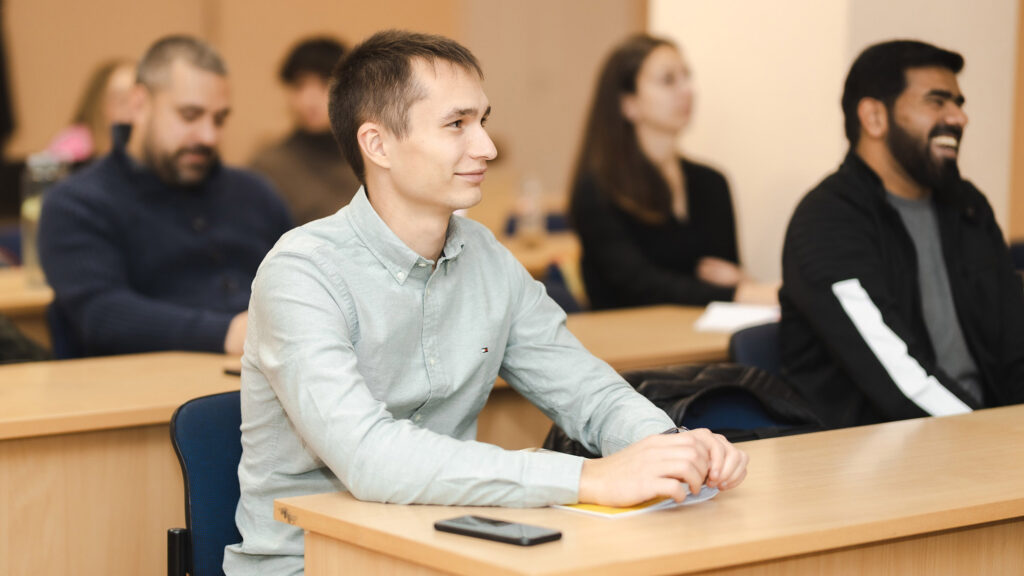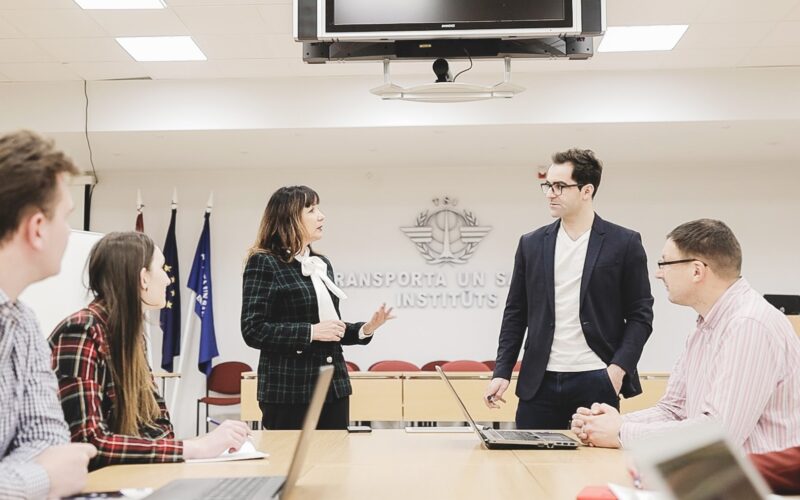Has AI taken over aviation yet? How does the COVID-19 pandemic continue to impact flights? How does a master’s degree help someone face new challenges while building an aviation career?
We’re discussing those and some other interesting topics with:
- Iyad Alomar, Dr.Sc.Eng., Assoc. Prof. at the TSI, Transport and Telecommunication Institute in Latvia, Director of TSI’s Bachelor’s Degree Programme “Aviation Engineering“, with 30+ years of experience in aviation and aviation training
- Yury Solovyov, M.Sc.Eng, Training Manager at TSI’s Academic and Professional Aviation Center APAC, with 15+ years of experience in aviation and aviation training
The impact of new technologies, including digitalization and Artificial Intelligence (AI), on various spheres of life is being actively discussed in society. What is the situation in aviation?
Yury Solovyov: Innovations are being introduced. Traditionally, the first to use new technologies is military aviation, then these solutions come to business aviation, civil aviation, and finally cargo aviation.
Iyad Alomar: The aviation industry has achieved good results in digitalizing operations management, including maintenance management. However, in the field of maintenance itself in aviation, digitalization is still slow. This is partly influenced by the fact that ‘old-school’ specialists are reluctant to adopt new technologies. Last year, for a scientific article, we surveyed specialists from several continents, and we were stunned by the level of distrust in the use of AI, robots, and so on. I think that in 10 years, when the generation of specialists changes, these prejudices will disappear by themselves.
In researching scientific publications, it is easy to note that the first mention of the potential use of AI in aviation maintenance dates back to 1986. I would say that since then, in almost 40 years, progress has been 0.5 on a 10-point scale. Even visual inspections of aircraft using drones are still rare. Many maintenance experts say: I’d rather stand on a ladder and check everything with my own eyes. A good example of a powerful implementation of digitalization and AI in maintenance is the Airbus hangar of the future. There, the use of drones is at a high level. You don’t even need a drone pilot for an inspection. The staff specifies the type of aircraft in the software, and the drone autonomously flies, taking pictures of the exterior of the aircraft. The AI then compares the captured images with the samples and tells the maintenance crew what to pay attention to. The AI can make mistakes and confuse dirt with hull damage, but it still makes the job easier. The problem is that this solution is very little used anywhere.
We are now developing a course called ‘Emerging Technology in Aviation’ for TSI’s Aviation Engineering undergraduate programme, so that students can better understand the capabilities of modern technology. For example, RFID tags can be used on rescue equipment in aircraft, which can be inspected at least five times faster. We also cover the application of AI in aircraft maintenance.

Photo: TSI archive, Bachelor’s programme Aviation Engineering lecture
We all remember how much the restrictions during the COVID-19 pandemic affected aviation. Can we say that the industry has already recovered from this shock?
IA: No. I would say that cargo operations, on the contrary, experienced a growth spurt during that period. But passenger operations suffered a lot. You can count on your fingers to see which airlines have returned to the same level of performance as before the pandemic.
YS: I agree. The problem is that the number of people working in the industry dropped during the pandemic. Fewer planes were flying, and fewer staff members were needed. There has always been a need for workforce in aviation, and now it’s even greater.
What kind of specialists are most lacking?
YS: There is a staff hunger at all levels. Numerically, we always need more people at the initial levels: mechanics, non-certifying staff, and certifying staff. People for managerial positions are also very much needed. We constantly need specialists who are ready to improve their education and qualifications, to move to the next league.
Data from various studies show that the higher the level of education, the more stable a person’s employment is and the higher their income. How exactly do you think higher education helps develop a career in aviation?
IA: Without higher education, the opportunities for career development in aviation are very limited. One can, for example, get a professional education as an aviation technician in two years. But in many countries, such a person cannot even become a shift supervisor without higher education. It is possible to learn to be a pilot in 18 months, then go through flight practice, work as a copilot, and be promoted to pilot. But let’s be honest: regular flying is a very big strain on the body, and I have often seen pilots retiring at 35 because of health problems. The cabin crew has the same problem. If a person doesn’t have at least a bachelor’s degree, at that point, they need to start their career from scratch in another field.
However, if you have a master’s degree in aviation, such as a Double Degree in Aviation Management from TSI (Latvia) and UWE Bristol (UK), it opens up opportunities at a whole different level. It is not always publicized, but in my experience in recruitment, I can see that a Master’s degree is a prerequisite for being considered for managerial positions in aviation.

Photo: TSI archive, AeroSim A320 3D & 2D Virtual Training Device
What categories of specialists will find this programme most interesting and useful?
IA: Most of our students are already working in aviation in some capacity – pilots, stewards, engineers. They have experience in the industry, and enroll in the Aviation Management master’s programme to boost their knowledge and qualifications. For them, the studies take only one year, plus writing a master’s thesis. The curriculum is module-based, and lectures are scheduled on weekends – three days in a row, every third or fourth week of a month. This blended learning format allows students to choose between online and on-site studies and to continue working while studying.
The Aviation Management programme can also be suitable for those with a bachelor’s degree in management, and who like to work with finance, statistical analysis, and budgeting. In aviation, you need people who can do market analyses. Finally, some people have always dreamed of working in aviation, who are passionate about it, who have studied background – for them, taking this programme can be a step towards working in this field.
What skills do the students of the programme hone?
IA: In obtaining a Master’s degree, a person learns to look at things more broadly and develops the skill of critical thinking and the ability to make decisions in critical situations. I always include such issues as the main task in my exams: I voice a problem that may arise with an aircraft and give 40 minutes to find a solution. If a student doesn’t show that he or she can at least start thinking in the right direction, I don’t credit the exam. This is a necessary skill for engineers like Yury, who are dealing with sudden malfunctions when there may be one hour left before the plane is scheduled to take off.
Problem-solving skills are important for the pilots, who sometimes have no more than 3 seconds to make a decision, and for the crew as well. There was a real case in the early 1980s when one of the four engines of an IL-18 aircraft caught fire and fell off at the beginning of the flight. The stewardess, who incidentally also had a university degree, managed to calm the panic in the cabin by saying: ‘Dear passengers, don’t worry, it’s time for this engine to be repaired, and we just parachuted it to the repair plant’. The passengers laughed and calmed down, and the pilots managed to land successfully at the nearest airport.
In this way, Master’s education empowers aviation specialists to make the right decisions and later to develop their careers by promoting to managerial positions.
YS: Indeed, studying at a Master’s level broadens the professional outlook, adding knowledge and skills to the basic skills acquired earlier. We talk about how a person can act in non-standard situations, how they can choose the best solution from a variety of solutions, how they can implement this solution both independently and working in a team.

Photo: TSI archive, Master’s programme Aviation Management lecture
What makes the TSI’s Aviation Management programme stand out from other aviation master’s programmes?
IA: This double degree programme is designed in cooperation with the University of the West of England (UWE Bristol). From UWE, the alumni get a degree “MSc in Aviation Management and Sustainability”, so there is an emphasis on sustainable solutions.
A special value of the programme is the lecturers. More than half of the lecturers are experienced practitioners who hold managerial positions in aviation companies. One is a Member of the Board at Riga International Airport, and the other is a Director of the Aviation Department at the Ministry of Transport of the Republic of Latvia, who supervises the entire aviation industry in Latvia. We have Prof. Romano Pagliari, Special Adviser to the Board of Directors at Luton Airport, etc. One of the subjects is also taught by a former representative of General Electric, which produces the engines that power most modern aircraft.
Student’s experience
Egija Vilka, student of TSI and UWE Bristol Double degree programme “Aviation Management”:
“I run a company in the aviation industry. I chose this programme because I want to promote sustainability as a shared responsibility for all of us. By taking care of the environment and sustainability, we take care of ourselves and future generations. The additional knowledge I gained at TSI will help me to implement technology in two projects that will contribute to sustainability. One project relates to sustainable aviation fuels and their use in the near future. And the other big project is the digitalization of the aviation refueling industry, where we want to go in the so-called “paperless” direction, using fewer resources while operating more efficiently.
I found the courses “Engineering Project Management” and “Airport Management” particularly relevant in my studies. Although I am already familiar with aviation and the airport environment, these courses helped me organize my thought process.”

